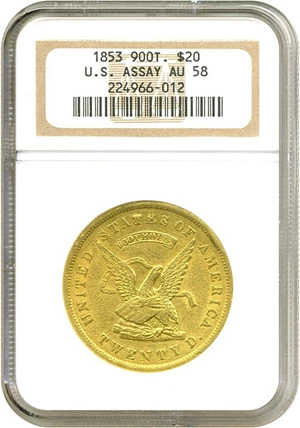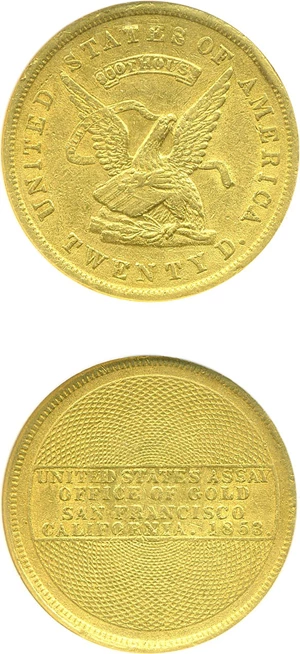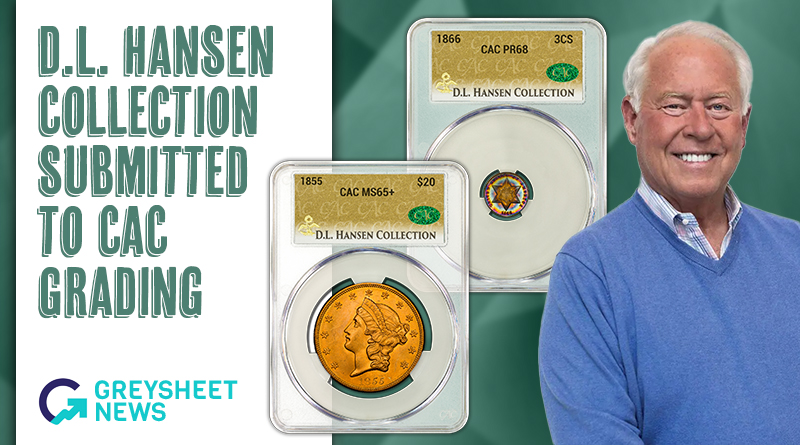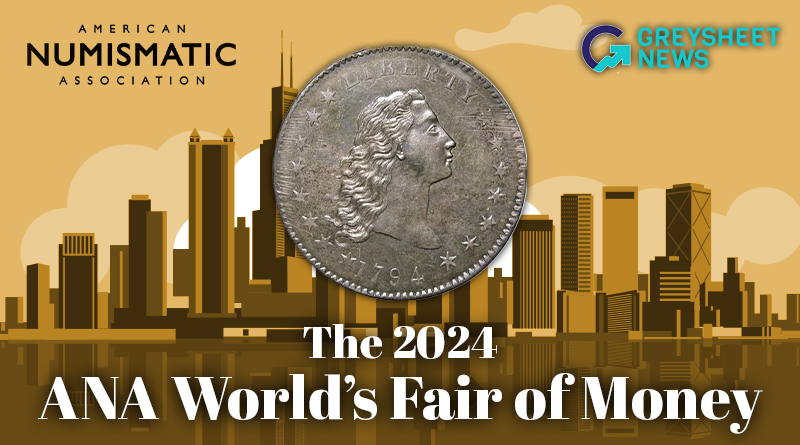- U.S. Coins /
- Pioneer & Territorial Gold /
- United States Assay Office of Gold (1852–1853) /
- 1853 G$20 U.S. Assay Office, TWENTY D., 900 THOUS, K-18 PR
1853 G$20 U.S. Assay Office, TWENTY D., 900 THOUS, K-18 PR

1853 United States Assay Office of Gold $20. K-18. Rarity-2. 900 THOUS. MS-60 (NGC).
Source: Stacks Bowers

1853 United States Assay Office of Gold $20. K-18. Rarity-2. 900 THOUS. AU-55 (NGC).
Source: Stacks Bowers

1853 United States Assay Office of Gold $20. K-18. Rarity-2. 900 THOUS. MS-60 (NGC).
Source: Stacks Bowers

1853 United States Assay Office of Gold $20. K-18. Rarity-2. 900 THOUS. AU-55 (NGC).
Source: Stacks Bowers

Assay $20 1853 900 NGC AU58
Source: David Lawrence Rare Coins

Assay $20 1853 900 NGC AU58
Source: David Lawrence Rare Coins

1853 United States Assay Office of Gold $20. K-18. Rarity-2. 900 THOUS. AU-55 (NGC).
Source: Stacks Bowers

1853 United States Assay Office of Gold $20. K-18. Rarity-2. 900 THOUS. AU-55 (NGC).
Source: Stacks Bowers

1853 United States Assay Office of Gold $20. K-18. Rarity-2. 900 THOUS. MS-60 (NGC).
Source: Stacks Bowers

1853 United States Assay Office of Gold $20. K-18. Rarity-2. 900 THOUS. MS-60 (NGC).
Source: Stacks Bowers










Greysheet Catalog Details (GSID: 11700)
Just a few legitimate proof strikes are known of this issue. Millions of dollars’ worth of the 1853 900-Thousandths $20s were struck by the United States Assay Office, making these double eagles the most commonly encountered pioneer gold issue. Between 500 and 600 examples are known today, with somewhere around ten grading MS65 or MS66. 17 Kagin-18 $20s were recovered from the S.S. Central America. So-called “Prooflike Assay $20” forgeries were marketed by John J. Ford in the 1960s. These were initially exposed in the 1960s by numismatist Eric P. Newman, and the coin from which their dies were copied was identified in 2006 by David J. McCarthy.
Obverse: Eagle clutching shield and ribbon UNITED STATES OF AMERICA 900 THOUS TWENTY D.
Reverse: Engine turning UNITED STATES ASSAY OFFICE OF GOLD SAN FRANCISCO CALIFORNIA. 1853.
Catalog Detail
Greysheet & CPG® PRICE GUIDE
From the Greysheet Marketplace
Buy Now: $8,950.00
Buy Now: $495.00
Buy Now: $1,450.00
Buy Now: $775.00
Buy Now: $2,800.00
Buy Now: $8,150.00
Buy Now: $580.00
Buy Now: $1,150.00
Buy Now: $1,320.00
Buy Now: $4,400.00
Related Stories (powered by Greysheet News)
View all newsAbout CDN Prices
All CDN prices are based on proprietary market knowledge and technology developed by CDN Publishing, LLC.
CPG® prices represent retail levels. Collectors should refer to CPG values as a starting place for their negotiations, or auction bid reference.
Greysheet/Greensheet prices are wholesale market levels for collectible coins/paper money intended to indicate what a dealer, or wholesale, buyer would pay for the described item in the specified grade. Greysheet/Greensheet represent "sight-seen" values based on a buyer's in-hand review. The actual value can be more or less than this depending on factors including eye appeal and market timing.
Bluesheet (NGC & PCGS) prices represent the highest sight-unseen offers to buy on dealer networks like CDN Exchange. In many cases, there are no active sight-unseen buy offers, so CDN looks to the recent lowest market values for such an item. For this reason, Bluesheet values typically represent the floor of the market for the specified item. CDN only tracks Bluesheet on certain items.
CAC prices are for U.S. coins that meet the standards of the Certified Acceptance Corporation. You can learn more about CAC on their web site.
Price movement is indicated for price changes in the last 30 days.
The prices listed in our database are intended to be used as an indication only. Users are strongly encouraged to seek multiple sources of pricing before making a final determination of value. CDN Publishing is not responsible for typographical or database-related errors. Your use of this site indicates full acceptance of these terms.


 Dealers Only
Dealers Only












